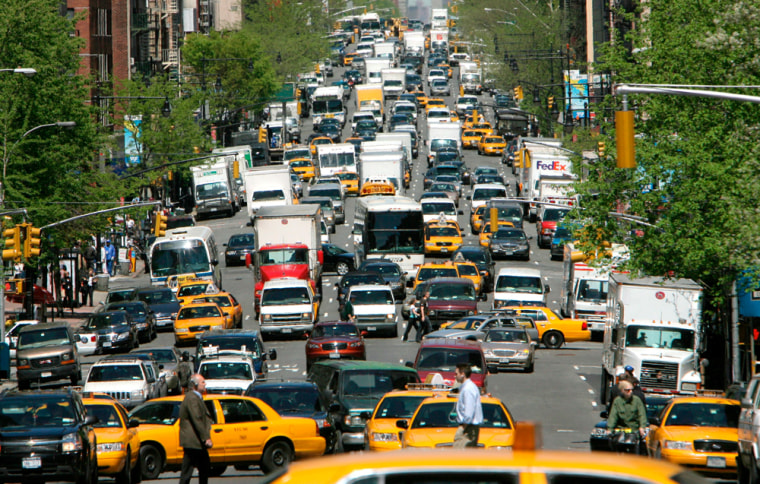Mayor Michael Bloomberg's plan to charge drivers extra tolls to enter Manhattan's most congested neighborhoods earned him invitations to speak at such gatherings as the U.N. climate conference and raised his profile as he considered a presidential run.
But the plan died Monday when Assembly Speaker Sheldon Silver in Albany announced his chamber wouldn't take up the proposal because of strong opposition within the conference dominated by New York City Democrats.
In a speech Tuesday at Georgetown University in Washington, the mayor shrugged off the defeat and said courage is needed in political leaders to take decisive action on the environment.
"A lot of people would still rather do nothing. It is sad but true. It takes courage to ask people to change — even if it won't really cost them much. Political leaders today are afraid of their constituents," he said.
The traffic fee proposal, known as congestion pricing, called for drivers of cars to pay $8, and trucks $21, to enter Manhattan south of 60th Street between 6 a.m. and 6 p.m. on weekdays. Opponents argued it was an unfair tax on middle-class commuters who drive to work for lack of mass transit options in their neighborhoods.
Bush administration backed idea
U.S. Transportation Secretary Mary Peters had said the administration hoped congestion pricing in New York could serve as a model for other cities nationwide. Charging drivers fees in congested city centers is a concept that has gained popularity around the world but has yet to be tried on a major scale in a large U.S. city.
By failing to pass congestion pricing before a midnight deadline on Monday, the state appeared to have forfeited an offer of $354 million in federal money to help kick-start the initiative.
A little more than a year ago, Bloomberg himself wasn't even persuaded the plan would succeed. He once said the idea was so politically charged that state lawmakers "will never let us do it."
But in the weeks leading up to the Earth Day 2007 speech in which he unveiled the plan, Bloomberg became convinced it was something New York City had to try, promising to "fight like heck" to get it done.
Bloomberg, an independent with less than two years left in his second term, has long portrayed himself as a maverick leader unfazed by forging ahead with unpopular policy decisions, such as banning smoking in bars and clubs and outlawing trans fats in restaurants.
City officials estimated congestion pricing would reduce traffic by about 6 percent and generate hundreds of millions of dollars in new revenue for transportation projects. Bloomberg shrugged off criticism that the fee was too high by comparing it to the price of a movie.
In lobbying for his plan, Bloomberg displayed a short fuse with anyone who didn't support the idea, painting opponents as "stupid" people who didn't care about the environment, progress and the health of asthma-afflicted children.
Bloomberg also was known to hint that lawmakers who backed his legislative efforts could be rewarded down the line with his political and monetary support, while those who didn't fall in line could suffer the consequences.
Silver, a Democrat, was also involved in another Bloomberg failure: The mayor's 2005 attempt to build a new football stadium and conference center on Manhattan's West Side collapsed without Silver's support.
